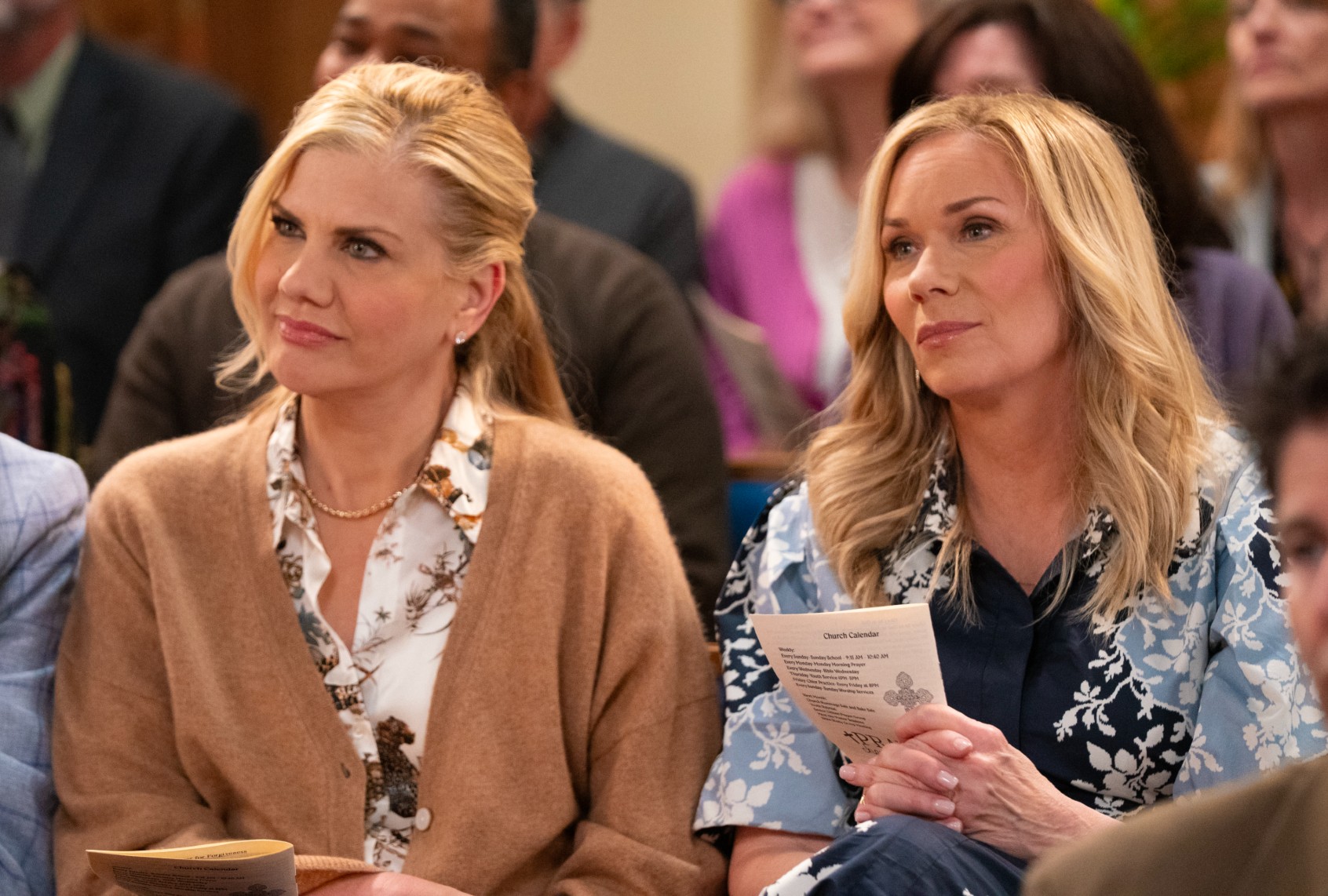Leanne Morgan’s stand-up, like her Netflix show, is as gentle and comforting as a church lady’s pound cake. Maybe we should liken it to Jell-O salad, since Morgan jokes in her 2023 comedy special that “her people” make one for every occasion.
Morgan’s Southern Christian identity is central to her act, although she doesn’t explicitly talk about church life onstage. Stand-up Leanne embraces being a 59-year-old grandmother, the physical challenges inherent to being menopausal and comfortable panties. She’s happily married to a guy with a pretty good sense of humor. In her 2023 act, she says how much she loves her husband even if he can be, in her words, “a real butthole.”
“It is a bad thing, I think, anytime we prop up an oppressive industry like the Southern megachurches that do nothing but prop up patriarchal belief systems.”
Sitcom Leanne, on the other hand, is processing the news that her husband of more than three decades, Bill (Ryan Stiles), is leaving her. She’s not excited to share that news with her family, but having the word leak out within her church community has her terrified. Far more frightening is the prospect of life as a divorcee, which she can’t imagine. The season’s other 15 episodes fill in those blanks.
“Leanne” received mixed reviews from critics, which isn’t surprising. Its co-creator Chuck Lorre fielded a similarly tepid response for “Two and a Half Men.” Unlike that CBS sitcom, which starred Charlie Sheen, nearly everybody finds Morgan to be irresistible.
But I don’t think that’s the only reason “Leanne” shares space with “The Hunting Wives,” another series set in a deep South enclave, on Netflix’s Top 10 list. Rather, it’s in the way each series validates Christianity as a central fixture in Southern culture.
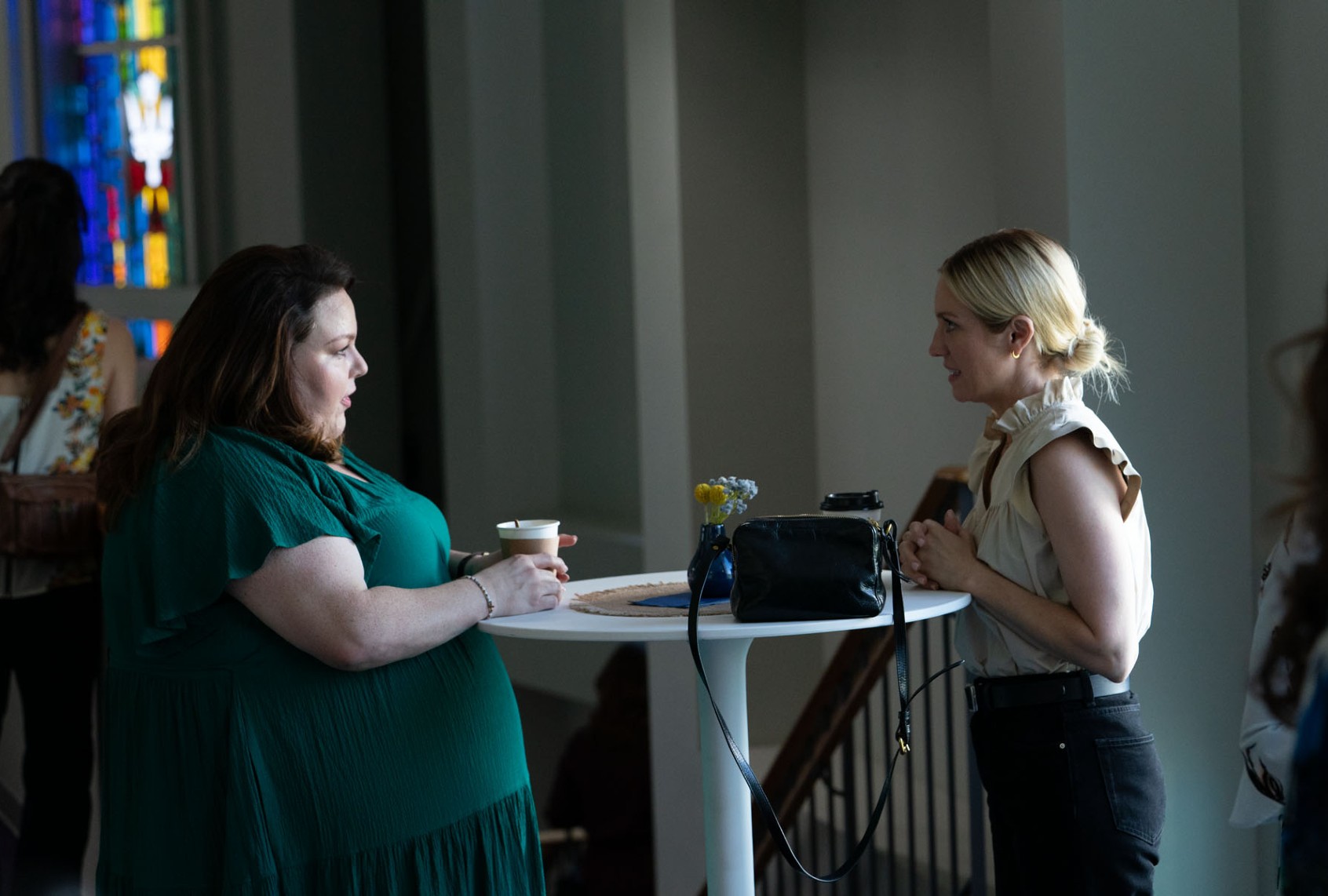
(Loren Aboumourad/Lionsgate Entertainment) Chrissy Metz and Brittany Snow in “The Hunting Wives”
There’s accuracy in that; they don’t call those states the Bible belt for nothing. We should also establish that these are extremely different shows. “Leanne,” like her brand, is PG-rated and depicts its small church as a third space where friends and neighbors exercise and socialize.
The Texas town’s megachurch in “The Hunting Wives” provides spiritual cover for trigger-happy hypocrites. When the titular women aren’t seated in its pews, they’re drinking, sleeping with each other and other people’s sons, and cooking up betrayals. Abortions happen, but in secret and only for those who can afford it. One wife is seen pegging her alpha male husband.
Neither show is overtly MAGA-coded. But they may be achieving what Hollywood’s appeals to supposedly working-class voters didn’t, post-2016 election, by enabling Netflix’s audience to have it all ways. “The Hunting Wives” is a guilty pleasure; “Leanne” is an honest, simple one. Viewers can find comfort in Morgan’s relatable kindness or find validation in the way “The Hunting Wives” depicts megachurch culture as both glamorous and corrupt. Plus, Nancy Grace makes a cameo. (Ooh! But also, ew.)
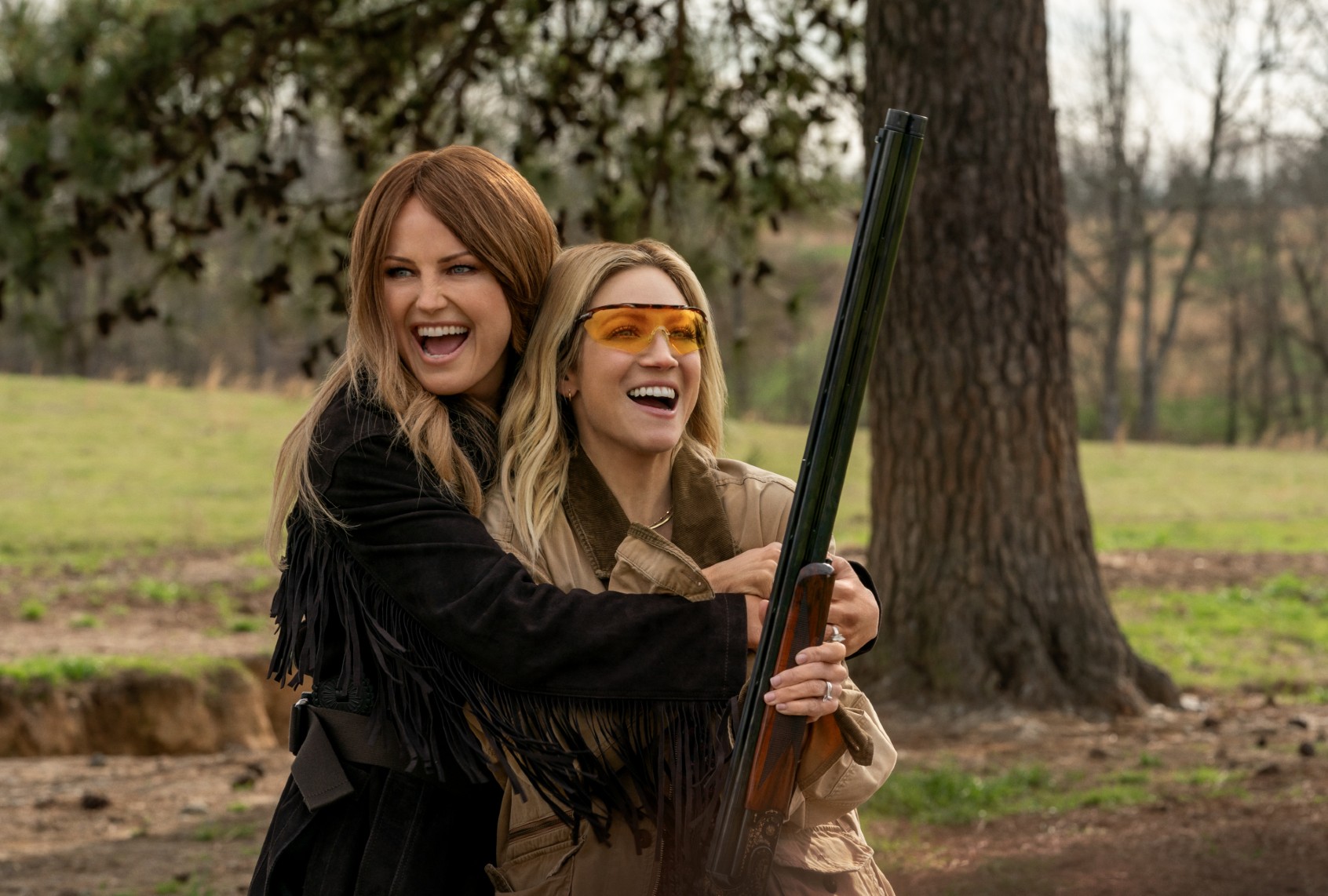
(Kent Smith) Malin Akerman and Brittany Snow in “The Hunting Wives”
Since these views come from someone who isn’t a white woman from the South, I turned to Jennifer Welch and Angie Sullivan, co-hosts of the popular podcast “I’ve Had It,” for their take on the shows. Welch and Sullivan are red-state progressives based in Oklahoma who resemble Fox News blondes. “We look like, ‘Oh God, where were these women on January 6?’” Welch joked. Not in a church pew. Welch says she was raised by atheists, while Sullivan grew up in a religious household.
So when they say they don’t see these shows as purely benign entertainment, it’s worth paying attention to why.
The Texas town’s megachurch in “The Hunting Wives” provides spiritual cover for trigger-happy hypocrites. When the titular women aren’t seated in its pews, they’re drinking, sleeping with each other and other people’s sons.
Welch refuses to watch “The Hunting Wives,” saying, “It is a bad thing, I think, anytime we prop up an oppressive industry like the Southern megachurches that do nothing but prop up patriarchal belief systems. All of these are massively white attended. It is a culture that creates individual exceptionalism. It is a culture that justifies being nice to a gay person or a Black person to their face and then voting against their best interests.”
That holds regardless of how crooked a show’s megachurch culture is depicted to be because its true purpose is rarely explored. “Big religion is where kids are getting indoctrinated,” Welch explained. “It’s not happening in schools. It is in these megachurches.”
Sullivan added, “You’re just so disaffected by reality. Like, you can live in cognitive distance your whole life, and you don’t question anything. Critical thinking is frowned upon, because then everything doesn’t make sense. So you have to stick with the script.”
Some of that plays out in “The Hunting Wives.” In the fictional Texas town of Maple Brook, Holy Horizon church is where oil tycoon Jed Banks (Dermot Mulroney) and his wife Margo (Malin Akerman) hold court alongside its stern pastor and his smiling wife Jill (Katie Lowes), and the town sheriff’s wife Callie (Jaime Ray Newman).
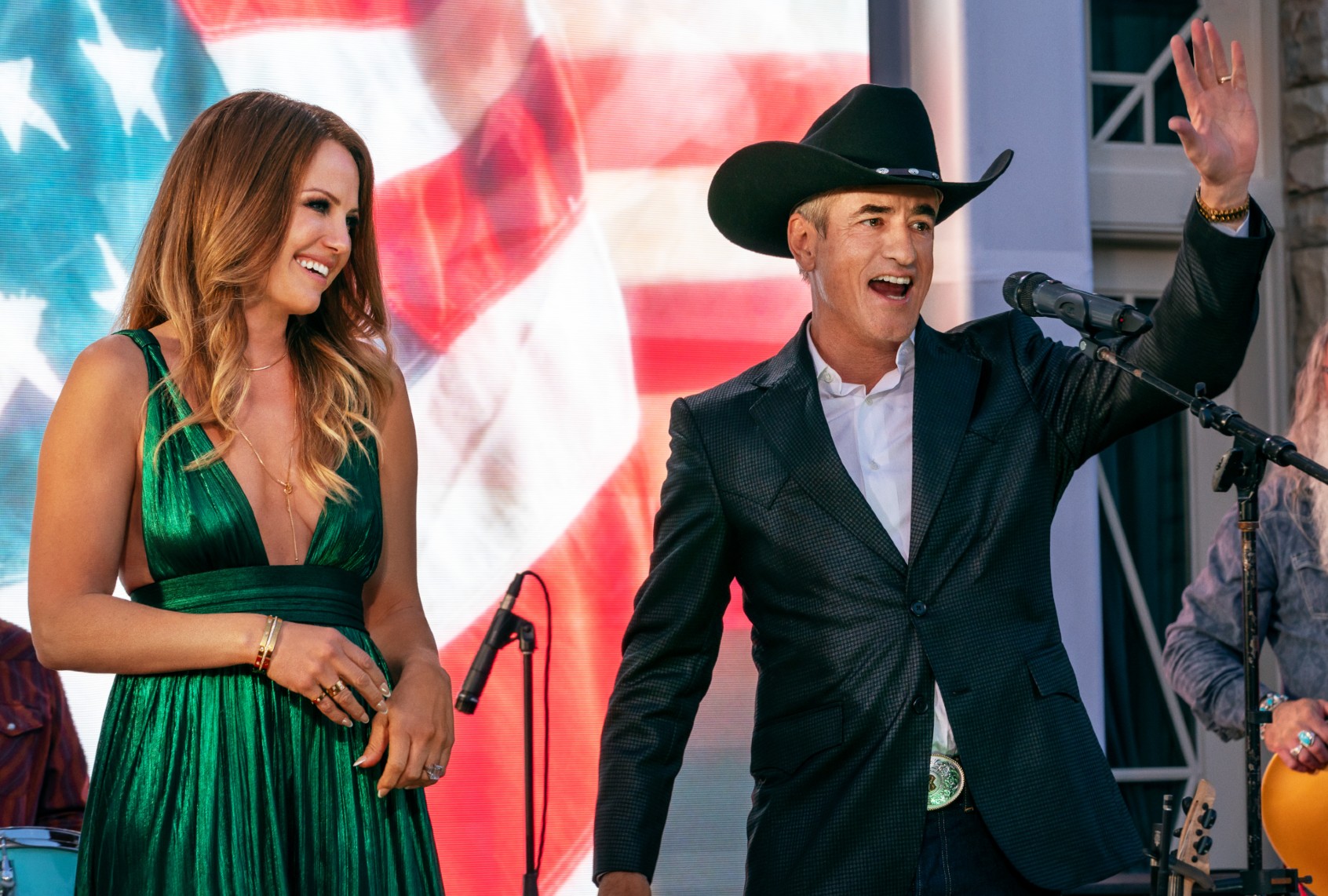
(Kent Smith) Malin Akerman and Dermot Mulroney in “The Hunting Wives”
Margo, Callie and Jill are besties, but when a Boston outsider named Sophie (Brittany Snow) moves into town, we see how thin their loyalty is. Margo reels in Sophie with sex. Jill, in the meantime, uses Margo and Jed to prop up the megachurch’s social and political influence.
Although a headline on Them.us wonders whether “The Hunting Wives” might be “the gayest show of the year,” there are no openly queer characters on the show. There is one Black “hunting wife,” but I couldn’t tell you what her name is. What’s apparent, though, is that the sex and the murder mystery driving the season obfuscate the patriarchal misogyny dominating these women’s lives.
Margo explains to Sophie that sleeping with other women is fair game for her and Jed, but she can’t sleep with other men. “Open marriages are for liberals,” she says disdainfully,
But the Banks’ libertine lifestyle is designed to serve Jed. Jill smiles through her husband’s verbal abuse, while her man of God turns a blind eye to his youth pastor’s predation on teen girls. Still, one can reason that these sins are committed by individuals and not the result of a religious system dedicated to repressing sexuality and oppressing women. This logic is similar to the NRA’s argument that a gun is only as good or evil as the person wielding it.
We need your help to stay independent
In contrast, the humble house of God on “Leanne” feels like a familiar experience to churchgoers. In the premiere, Morgan’s namesake character and her sister Carol (Kristen Johnson) serve food during fellowship hour, and she slices a generous, jiggly portion of that familiar Jell-O salad for a fellow parishioner.
But even this nice moment carries a squeamish undercurrent. The woman she’s serving is Black, one of the few seen in the show. Leanne gently tells her she considered her diabetes and made it sugar-free. “Don’t need you losing another foot!” Leanne says kindly, earning a few gales of canned laughter.
Welch doesn’t see those small asides as benign. “The Black characters that you’re talking about that are placed there. We can attest to that,” she said. “This is to make white people feel less racist when, in fact, they’re talking about the Black friend having diabetes. How much more stereotypical can you get?”
“So that is gaslighting to white people,” she added, “providing them a permission structure to not look at their moral choice and what they’re doing.”
Here is where I’ll call on my Catholic upbringing and confess that I enjoy Morgan’s comedy. I was also raised in a close-knit and mostly loving church community. Therefore, I somewhat empathize with folks like Morgan who aren’t part of a megachurch culture.
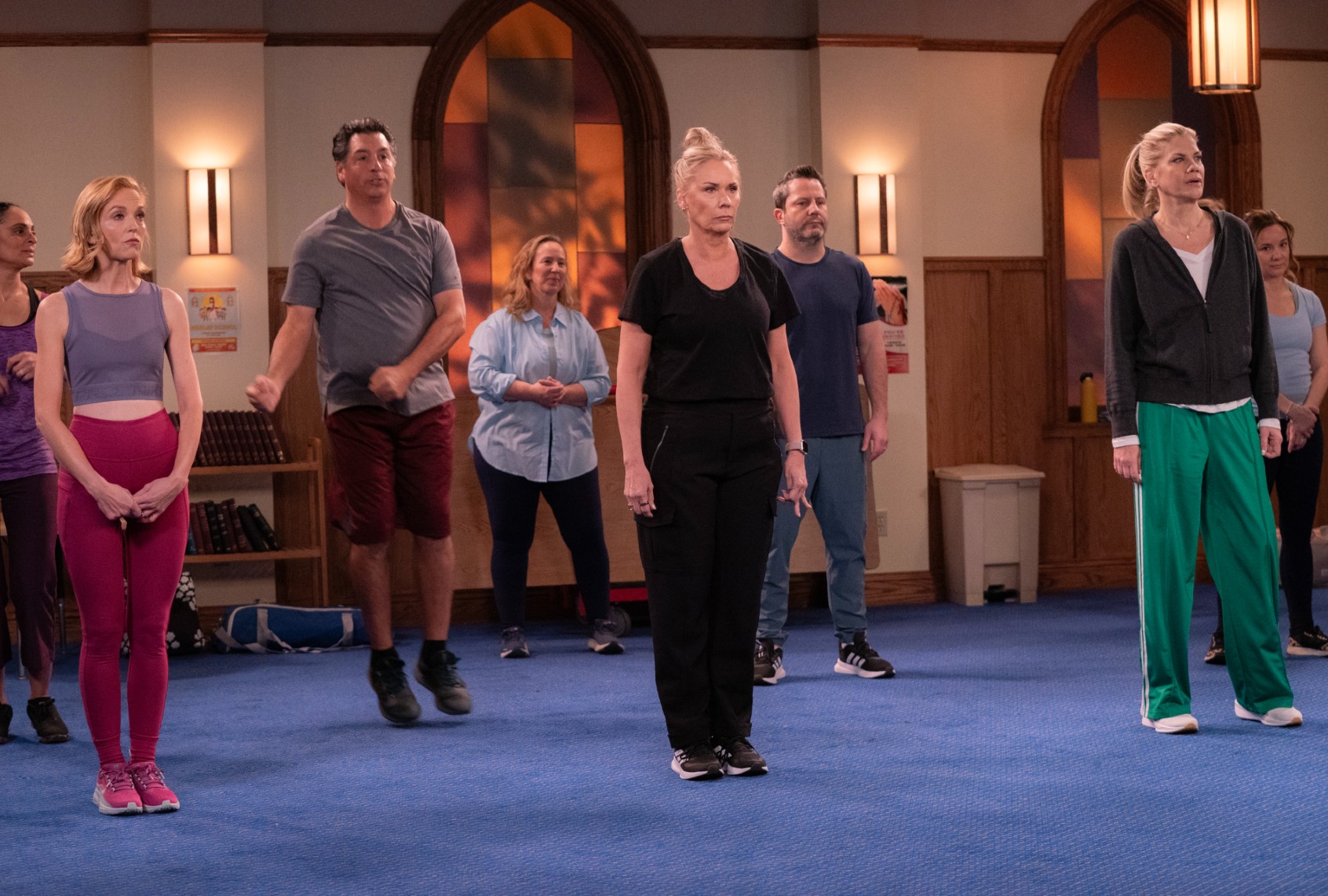
(Patrick McElhenney/Netflix) Jayma Mays, Leanne Morgan and Kristen Johnston in “Leanne”
“Leanne” depicts Sunday worship as an intimate experience where everybody is up in everyone else’s business. Sullivan argues that niceness doesn’t really matter. “Unless these shows are depicting how much misogyny goes on in these churches,” she says, their normalizing narrative presence is dangerous.
Morgan’s comedy is also broadly relatable. She’s joked about aging for years. Now, the zeitgeist has caught up to her. Oprah Winfrey featured Morgan as a guest on both her podcast and her recent menopause special. She’s been interviewed by Time, The Hollywood Reporter and other national publications.
“Leanne” depicts Sunday worship as an intimate experience where everybody is up in everyone else’s business. Sullivan argues that niceness doesn’t really matter. “Unless these shows are depicting how much misogyny goes on in these churches,” she says, their normalizing narrative presence is dangerous.
Originally, I envisioned this story to be about the entertainment industry’s shift toward featuring more varied perspectives from women living in red states. I would have loved to talk to Morgan about her show’s depiction of her church life and Knoxville. But Morgan, through her representatives, declined to participate in this story. A follow-up outreach asking about her future availability went unanswered.
I wish she could have weighed in, because it’s not as if religion and politics have never successfully mixed in sitcoms. Earlier this year, Norman Lear’s comedy “Clean Slate” depicted the Black church as a support system in the Alabama community where a father-daughter duo played by George Wallace and Laverne Cox live. More than that, it genuinely grappled with their churchgoing neighbors coming to terms with Cox’s character’s transgender identity. Many are welcoming. Some, including the church’s pastor, are not.
But the show that set the bar for the meeting place of Southern life, politics and religion was “Designing Women,” in which characters regularly attend Sunday service and engage in conversations about Scripture. The late Dixie Carter’s Julia Sugarbaker is a proud Georgia liberal who, in one of the show’s incisive monologues, lambastes a right-wing blowhard advocating for inserting prayer into schools.
Reportedly, Carter was a Republican who didn’t agree with many of her character’s views. But she played the part in a way that made Julia’s stand against the Reagan right’s assault on the separation of church and state feel significant.
In contrast, Morgan insists she “wouldn’t know how to talk about politics.”
“Honey, if you want to talk about fingernail polish or a spray tan, I’m good at that,” she told The Hollywood Reporter, adding that she takes her cues from Dolly Parton. “[And], like her, I just don’t want anybody to feel uncomfortable.”
That doesn’t work for the hosts of “I’ve Had It.” “I think, what a privilege,” Sullivan said. “What a privilege that you don’t have to be political because, number one, you’re white, so you get away with everything. And you have money. That’s what insulates a bunch of the people I grew up with — money.”
Parton also has money she’s used to financially support the development of the Moderna COVID-19 vaccine, advocated for Black Lives Matter in 2020, founded a program to promote children’s literacy, and spoke out against Tennessee’s anti-trans legislation in 2023, part of her longtime advocacy for the LGBTQ+ community. So.
Start your day with essential news from Salon.
Sign up for our free morning newsletter, Crash Course.
Welch imagines that Morgan has queer people or people of color in her life who helped advance her career. She and Sullivan point out that Tennessee has a total abortion ban. In the show, Leanne’s son is married to a woman played by Annie Gonzalez, a Hispanic actor. Gonzalez’s character spends most of the season pregnant . . . and off-screen.
In the real world, pregnant women in Southern states have died under abortion bans. To be clear, we wouldn’t want this for Leanne’s new grandchild. We’re still talking about a comedy that’s trying to help everyone relax a little.
But as Welch insisted, it’s possible for Morgan to use her platform to acknowledge that Tennessee’s elected officials have made life less safe for women and children without clouding its sunshine.
A counterpoint to that is we’re living in a time when the comedy world is dominated by polarizing performers who are mainstreaming bigotry. “The Hunting Wives” nods at that reality through characters scoring political points by fearmongering about undocumented immigrants and the liberal outsider in their midst. But it is not a show about honest-to-God people. “Leanne” is, and that gives Morgan the moral authority to stand against that tide instead of monetizing neutrality.
“Maybe if Mitt Romney were president, we could say we’re not going to be political. Right now, everything about this hits different,” Welch said. “I wish Leanne the best. I’m speaking only in broad terms about this. I wish her success, because I love the story of a woman in her 50s kicking ass and getting a Netflix show. Everything in me loves that for a woman. I just wish that everybody had a little bit of courage . . . And so that’s just something I think we all need to prod each other to do.”
“Leanne” and “The Hunting Wives” are streaming on Netflix.
Read more
about this topic
